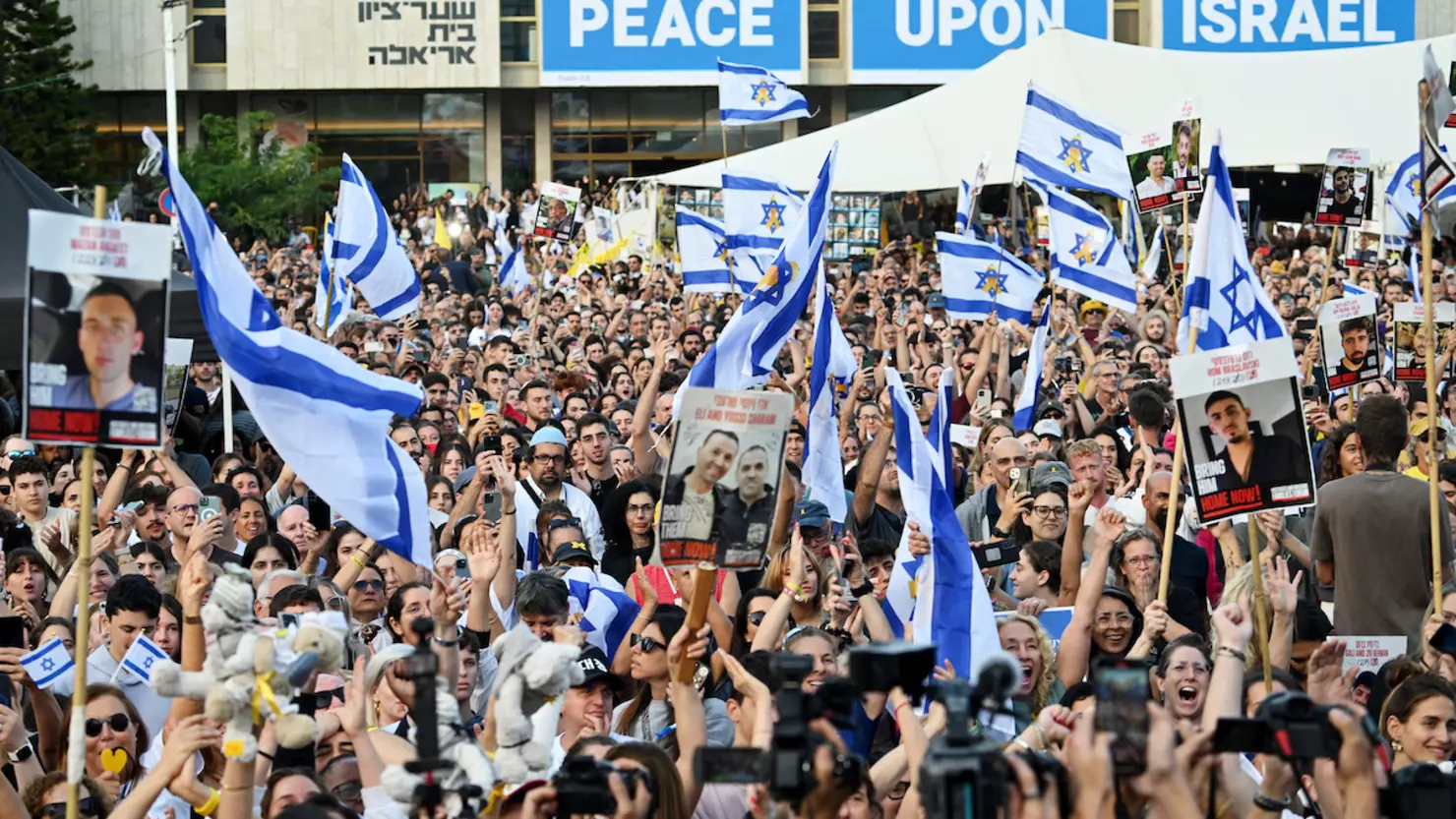To Choose Joy

By request from a number of members, I’m publishing some thoughts from my Drasha on Shmini Atzeres 5786.
This is the day after. The day that the world has been be speaking of for two years. With fear, with questions. What will Israel do the day after?
For us it was never a question. This day, the day after, is the day we embrace our brothers and sisters who returned from captivity. It is the day we mourn those who did not.
It is the day to remember when it all began.
Miraculously, today is also the day that Hashem gave us Simchas Torah again. Somehow, this year, we can celebrate, with joy and tears.
Last year, it seemed like our celebration was divorced from reality, a suspension of our the current pain of Klal Yisrael. We drew from ancient wells of joy; from generations past, from futures yet unknown. With danced with the Torah, shrouded in tears.
This year, the tears are still there. They have not abated, but somehow, our hearts and lives are bigger. In the grand collective soul of our nation, joy and tears can be held together.
I, along with all of you, watched the overwhelming emotional reunions. David HaMelech wrote about these moments: כי רגע באפו חיים ברצונו – For His anger is but a moment, Life is with His will. Rav Moshe David Valle explains this Pasuk as a taste of what the future final redemption will be. When that great day comes, it will feel as if all the pain was only a moment.
והנה יכירו וידעו גם הם בגמר מלאכתם שכל הצער שהיה להם בזמן הבירור אפילו שהיה זמן הרבה לא יחשב בעיניהם אלא כרגע קטון בעת שיתגלה הרצון העליון המביא את החיים וזה סוד כי רגע באפו חיים ברצונו ורזא דא ברגע קטון עזבתיך וברחמים גדולים אקבצך בערב ילין בכי זהו זמן הגלות והבירור הדומה לערב ולבקר רנה זהו זמן הגאולה הדומה לבקר כי מתעורר בו רזא דבקר לאברהם להציל ולהושיע
The pain is still there. But somehow the joy will be greater.
All over social media, people have been sharing the Pasuk from Nechemia 8 that defines this Chag:
וַיַּעֲשׂוּ כל־הַקָּהָל הַשָּׁבִים מִן־הַשְּׁבִי סֻכּוֹת וַיֵּשְׁבוּ בַסֻּכּוֹת כִּי לֹא־עָשׂוּ מִימֵי יֵשׁוּעַ בִּן־נוּן כֵּן בְּנֵי יִשְׂרָאֵל עַד הַיּוֹם הַהוּא וַתְּהִי שִׂמְחָה גְּדוֹלָה מְאֹד׃
And all the congregation that had returned from the captivity made succoth, and they dwelt in the succoth. For the children of Israel had not done so from the days of Yeshua the son of Nun until that day. And the joy was very great.
Indeed, the joy we are feeling is enormous. But the Gemara (Arachin 32b) explains what they did what that joy:
דִּבְעוֹ רַחֲמֵי עַל יֵצֶר דַּעֲבוֹדָה זָרָה, וּבַטְּלֵיהּ They prayed for mercy with regard to the evil inclination of idol worship and nullified it.
What was it about this joy that was so transcendent, so powerful that they vanquished all desire for idolatry?
These were the Jews who had returned from Babylonian, Persian and Median Exile. It was this season about which Nechemia writes:
אַל־תִּתְאַבְּלוּ וְאַל־תִּבְכּוּ כִּי בוֹכִים כּל־הָעָם כְּשׁמְעָם אֶת־דִּבְרֵי הַתּוֹרָה׃ Do not mourn and do not weep. For all the people wept when they heard the words of the Torah.
The people wept for their failures, their sins, their impotence and ignorance. They wept for the first Temple, whose glory would never be restored. The wept for the vast majority of their brothers and sisters who chose to stay in exile, never to return.
And yet, that Sukkos, they celebrated. They chose to celebrate. They chose joy, despite the pain.
Chazal (Sanhedrin 94a) tell us: בִּיקֵּשׁ הַקָּדוֹשׁ בָּרוּךְ הוּא לַעֲשׂוֹת חִזְקִיָּהוּ מָשִׁיחַ, וְסַנְחֵרִיב גּוֹג וּמָגוֹג – Hashem wanted to make Chizkiyahu Mashiach.
אָמְרָה מִדַּת הַדִּין לִפְנֵי הַקָּדוֹשׁ בָּרוּךְ הוּא: רִבּוֹנוֹ שֶׁל עוֹלָם, וּמָה דָּוִד מֶלֶךְ יִשְׂרָאֵל שֶׁאָמַר כַּמָּה שִׁירוֹת וְתִשְׁבָּחוֹת לְפָנֶיךָ – לֹא עֲשִׂיתוֹ מָשִׁיחַ, חִזְקִיָּה שֶׁעָשִׂיתָ לוֹ כּל הַנִּסִּים הַלָּלוּ וְלֹא אָמַר שִׁירָה לְפָנֶיךָ – תַּעֲשֵׂהוּ מָשִׁיחַ? לְכָךְ נִסְתַּתֵּם.
The attribute of justice said before the Holy One, Blessed be He: Master of the Universe, and if with regard to David, king of Israel, who recited songs and praises before You, You did not designate him as the Messiah, then with regard to Hezekiah, for whom You performed all these miracles, delivering him from Sennacherib and healing his illness, and he did not recite praise before You, will You designate him as the Messiah?
Why didnt Chizkiyahu sing? Perhaps he didn’t sing because ten tribes had been exiled. Perhaps because his nation had been miraculously spared, and yet, the toll of war, siege and fear was still thick in the air.
But Hashem has given us this day, this Chag. This moment to sing, to rejoice, to say Thank You Hashem.
And perhaps, if we can choose joy, choose life, choose each other, choose Hashem, then we too can vanquish the evil plaguing our world, our souls, our lives.
May we soon merit the words of the Navi: בְּרֶגַע קָטֹן עֲזַבְתִּיךְ וּבְרַחֲמִים גְּדֹלִים אֲקַבְּצֵךְ׃ – For a little while I forsook you, but with immense love I will bring you back.
___
Subscribe to this blog here👇.
YouTube: www.youtube.com/raelblum Facebook: facebook.com/rael.blumenthal